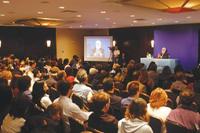Interview with Rav Michael Laitman, PhD
Questions answered by Rav Michael Laitman PhD—from an Interview with New Jersey's "Courier Post"
Q: Why do you call Kabbalah a science and not a religion?
A: It's called a science because this is what it is. The wisdom of Kabbalah started about 5,000 years ago in ancient Babylon. At that time, the whole of humanity was connected and they were together as one nation. Egoism began to grow within people; they became more alienated, which then prompted the whole famous story of the Tower of Babylon.
The cure for that was a method that was discovered by a certain individual whom we know today as Abraham. He discovered a method to reconnect people despite the growing egoism.
The method he discovered was a scientific method. In other words, it uses scientific research tools to investigate our own internal mechanism, and that is what we know today as the wisdom of Kabbalah. Judaism, Christianity or Islam date much later than the wisdom of Kabbalah and are actually unrelated.
Q: Can you study Kabbalah while practicing a religion?
A: Yes, anyone can study Kabbalah. It really makes no difference whether you belong to a certain religion or you are completely secular. The wisdom of Kabbalah is beyond all that. It is totally unrelated and you can study it regardless of anything else you do in life, not just religion, but any other belief system or practice that you do.
Q: Is there any difference between authentic Kabbalah teaching and the practice of celebrities like Madonna?
A: Yes, there is a big difference. First of all, to study authentic Kabbalah, you need to study from the authentic sources. Kabbalah uses five basic authentic sources, which are the writings of Abraham, The Book of Creation, and Moses, what we know today as the Pentateuch (also known as the Torah or the first five books of the Bible), then came The Book of Zohar, the writings of the Holy Ari, and Rabbi Yehuda Ashlag in the 20th century and his writings. By the way, Ashlag's writings are the best adapted for our generation to study.
In addition, Kabbalah is a study. It's like any science. There are no objects—no red strings, holy water, any kind of fortune-telling, mysticism, charms—none of that belong to authentic Kabbalah, not even meditation. It's just pure study of reality and it enhances your perception of reality to enhance your control over your own life and life in general.
Q: But there is spirituality?
A: Yes, spirituality is that aspect of reality which is not perceived by our ordinary five senses. The wisdom of Kabbalah simply enhances your perception of reality. It gives you additional tools which you wouldn't acquire otherwise.
Just like physics gives you certain tools, Kabbalah gives you other tools. You need all kinds of sciences to achieve a complete picture of reality. Kabbalah takes you, so to speak, behind the scenes.
Picture it as embroidery. You see a beautiful picture in front of you, of scenery or a flower, etc. If you turn the embroidery around you see a whole mess of threads. You have to know how the threads are connected to know how to make it into a beautiful flower at the front of the picture. That's what Kabbalah teaches you, how to connect the threads from behind the scenes.
Q: How does Kabbalah change one's life?
A: When you begin to see the forces behind the embroidery we were talking about, you begin to see how all the threads of your life are connected and then you begin to know how to make those connections better for you, so you don't make mistakes that you would otherwise make.
It puts every aspect of your life in order. For example, in families, it strengthens your family ties; in terms of education, it helps you understand your children and it helps you to be better understood by your children, it prevents such problems as drug abuse, depression because you begin to understand the world and live in harmony with it. The world isn't just nature; it's the people around you and yourself most of all. Kabbalah allows you to do that on a personal level, on the social level, and on the global level.
For example, today, it's not a secret that we have a global crisis. We see in every aspect of life, beginning from climate and ending in our own personal lives in depression and disease and whatnot, we have a crisis in every aspect of life. Kabbalah offers a solution because it tells you what's going on behind the scenes and how you can make a difference there. Today, more than any other time in history, disclosing the wisdom of Kabbalah is a must.
Q: What is it like to connect with the Creator?
A: It's a personal connection. It's as if you stop caring for yourself and you experience everybody else's thoughts and cares. You become connected and related and you feel beyond. You don't just feel it, you really are beyond time and place and motion. You become eternal in a way, because you have eternal perception. It gets you to a point where you just want to give and give.
Q: Is that why you want to share this with other people, because you want to give them this same experience?
A: Yes, of course. You experience the harmony of nature and reality and you want to share it. Also, it's not just a privilege. It's really an obligation, because the whole of humanity must come to that point where all of us experience that harmony. Actually, the crisis we are experiencing today is not coming for no reason. It is there to prompt us to think about life, to see how we can build our harmony with it.
